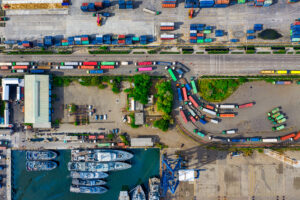Disruption in a rapidly-changing economic environment has become ‘the new normal’. Against this volatile operating backdrop, to gain a foothold or advantage in increasingly competitive and challenging marketplaces, your business needs to leverage smart opportunities and side-step potential threats.
Over the past two years and for its previous early adopters, the emerging blockchain industry is building a foundation for industry, business, governments and professional service firms for future survival and success. Despite vested interests which present significant hurdles ahead, worldwide in 2017, organisations are analysing how blockchain technology can transform their existing processes, cut out intermediaries and substantially lower costs.
Supply Chain sector set to be a big winner from Blockchain’s disruption
For Australia’s supply chain sector, blockchain presents multiple benefits, spearheaded by increased transaction transparency and accuracy. Supply chain expert Timothy Dowsett of consultancy Carinya Group Management Consultants said that blockchain technology is increasingly mainstream.
“There are so many advantages, starting with immediate and transparent payment in real- time as goods physically change ownership as deliveries occur and payments are automatically triggered in a tamper-proof process. That increased accuracy and instant recording reduces lead times and minimises fraud”.
“This will be of particular benefit in international supply chains, such as the Australian agribusiness export sector, which operate in countries with less sophisticated supply chains where data entries need to ‘catch up’ with the movement of physical goods. In many current instances, although the delivery is made, the recorded transaction may be delayed, or shipping documents not signed, paper work misplaced, or data keying errors are made in the system.”
Dowsett said that for Australian business currently trying to digitise their supply chains, blockchain is already demonstrating value for payment senders and recipients, eliminating paper-transactions and decentralising financial processes. “The technology’s benefits will appeal to organisations and industries which until now have needed to operate strict document audit trails across their procurement and transportation processes.
“It’s faster and more cost-effective, with lowered fees and expenses via bypassing payment delays and transaction fees. This presents a major threat to traditional banking’s near-monopoly, particularly as an alternative to international payment systems such as SWIFT. Once the physical goods arrive you automatically get paid, which is a win for all parties involved”.
Australian agribusiness one of the first sectors to benefit
Stephen Rowlison, a blockchain technology solutions expert and CEO of the Australian-based bBiller supply chain commerce platform built on the Ethereum blockchain, believes the technology is the way of the future. An Initial Chain Offering (ICO) project for bBiller was launched in August 2017. One application of the bBiller blockchain under consideration is a supply chain solution from Australian livestock breeders for selected Asian customers. Rowlison is confident that many other Australian companies will also want to invest in this ICO to create their own blockchain-enabled supply chain solutions.
Also the editor for UBL Ethereum Smart Contracts at Ausdigital.org, Rowlison says that blockchain technology is already here and will have a huge impact on Australia’s economy. “Whether it takes up to 1-2 decades to become mainstream, blockchain is an inescapable disruptive force. It’s evolution and will be transformational for international business and economies.”
“For Australia, agriculture is a good entry point, while the food and manufacturing industries are looking at blockchain’s potential to automate and track supply chain processes. There are vested interests and competitive head-winds ahead and many professions from auditors, bankers, solicitors, bookkeepers and regulatory bodies that will have to change their model. But there are exciting developments and benefits ahead across the board.
“There are so many benefits, starting with the tiny transactional cost for an direct and instant peer-to-peer transfer, with those funds already held in escrow. Business and supply chains can say goodbye to the high costs of preparing and sending an invoice, or paying bank transfer fees, lower costs and see higher value from direct and instance transactions, often getting better products at a lower price.”
“Transparency is a huge advantage, as well as being able to accurately plan businesses will also be able to see a problem and immediately fix it, ‘pay-as-you-go’ for government fees and taxes, automate back-end processes and payment systems. For both large and small organisations, it offers an entirely new different strategic perspective and new ways of connecting with international partners and handling global logistics, while automating back-end processes and payment systems.”
Australia aims for blockchain leadership
Our government’s leading research agency, the CSIRO’s innovation arm Data61, has recently released not one but two blockchain reports aimed at public and private sector organisations learning about or trying out the technology.
Stating that Australia must be at the forefront of the emerging technology, the first report focuses on four possible scenarios for Australian blockchain adoption, with the second looking at opportunities and risks in the example areas of government data registries, agricultural supply chains and remittance payments.
Data61’s Chief Adrian Turner, said “It has potential to reframe existing industries like financial services and seed new ones like food provenance and personalised health”, with Australian treasurer Scott Morrison commenting ” The reports demonstrate the benefits of this technology could be profound – delivering productivity, security and efficiency gains.”
Data61’s key recommendations to policymakers and regulators echo Australian industry’s endorsement of implementing technologically-neutral regulation and policy, calling for expanded research and development into blockchain and regulatory acceptance of blockchain-based systems.
In March, Australia’s leading industry body Standards Australia issued its Roadmap for Blockchain Standards Report, outlining how it will support Blockchain systems’ privacy, security and interoperability within its broader initiative addressing the development of international Blockchain standards, with Australian government backing.
After many years of consideration into the evolution or replacement of its 20-year-old CHESS clearing system, the Australian Securities Exchange is examining blockchain’s usage in clearance and settlement, collaborating since 2016 with external blockchain experts on its potential way forward.
Other major Australian organisations exploring blockchain technologies include our big banks, Australia Post and AGL. Around the country, new conferences have sprung up including the now-annual Blockchain Summit Australia first hosted by Digital Disruption X in 2016, Flinders University’s 2017 Current Directions Blockchain Conference and Sydney’s APAC Blockchain Conference in March this year run in association with the Australian Digital Currency Commerce Association (‘ADCCA’).
Will blockchain be a worldwide payment revolution?
Locally and internationally over the next 1-2 decades, can blockchain technology revolutionise the world’s inflexible and centralised banking and payment model?
The answer definitely seems to be yes. Our current centralised money supply system significantly escalates the delayed confirmation and cost of financial and business transactions. Paper-less transactions are still not universal, while transactions still need to be expedited, authenticated and verified by third-parties – at your organisation’s expense.
In contrast, blockchain technology leverages an anonymous public ledger route to record transactions, side-stepping the need for third party involvement. Blockchain’s algorithms and miners authenticate transactions by ‘chaining’ the various processes together via a cryptographic signature.
Centralised Blockchain technology cost-effectively utilises smart contracts and self-executing cryptocurrency contracts that are kept, replicated and administered within the blockchain network for transactions including property, insurance premiums, legal situations, financial services and more.
Conclusion
Carinya Group Management Consultant’s Dowsett believes that “blockchain is the future for Australia and its supply chain sector. Its potential for both our industry and others is massive, leveraging its capability to eliminate intermediaries, provide transparency for real-time transactions and securely hold and record these instant transactions in digitally shared ledgers.
Worldwide and in Australia, interest in blockchain technology is exploding, with government and private sector research, testing and implementation expanding exponentially since 2016. The potential is huge – a 2016 World Economic Forum report states that over $1.4 billion was invested in the technology in just the past three years.
“It won’t be suitable for everyone, as each company’s supply chain is different, but when there is a need for total transparency from the ssupplier’s supplier right through to the customer’s customer, then a blockchain-enabled supply chain will be appropriate.”
The next 2-3 years will certainly be intriguing for both participants and curious market watchers.
About Carinya Group Management Consultants
Carinya Group Management Consultants (Carinya Group) is a specialist advisory consultancy focused on solving Operation Strategy, Supply Chain Management and Logistics challenges faced by companies and organisations in Australia and the Asia-Pacific region.
Timothy Dowsett is the Managing Principal at Carinya Group Management Consultants. He has over 25 years’ experience in consulting and line management roles across the entire supply chain function. For more information call (+61 421 054 550), email webinfo@carinyagroup.com.au or visit www.carinyagroup.com.au.
Sources
http://theconversation.com/what-next-for-the-asx-and-blockchain-in-2017-71472
https://www.coindesk.com/australias-government-publishes-blockchain-research-studies/
http://www.data61.csiro.au/en/Our-Work/Safety-and-security/Secure-Systems-and-Platforms/Blockchain
http://www.abc.net.au/news/2017-05-30/bitcoin-cryptocurrencies-and-rise-of-ethereum/8573416
https://www.nviflinders.com.au/2017/06/20/blockchain-digital-ledger-technology-case-studies/
https://futurism.com/australia-joins-the-tech-train-with-ai-and-blockchain/
https://exportcouncil.kontribune.com/articles/8301[TS1]



